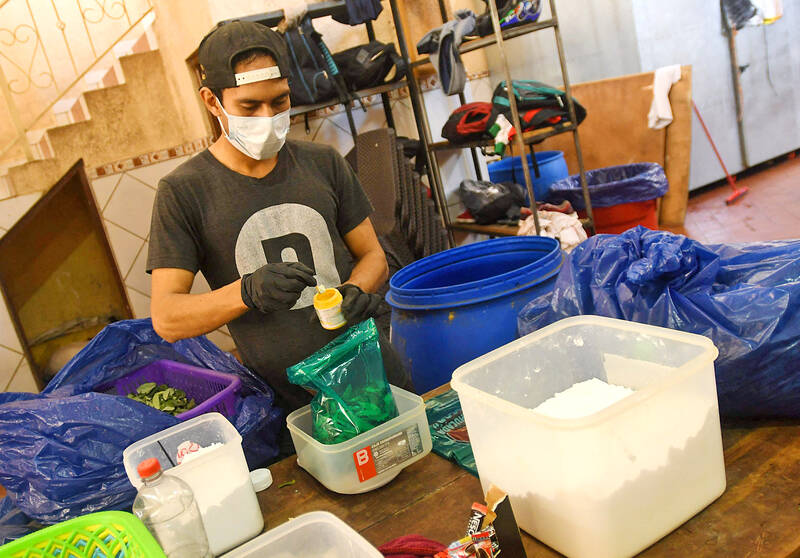Bitter and tough, the coca leaf chewed throughout the South American Andes for thousands of years as a natural pick-me-up has been getting an appetizing makeover in Bolivia.
Traditionally sold as untreated, chopped leaves, several small businesses are now bruising the foliage to make it softer, and adding flavors such as strawberry, mango or coffee.
What started as an experiment about a decade ago has really taken off, especially in Bolivia’s economic capital of Santa Cruz — a city of 3.4 million people.

Photo: AFP
“The flavoring is like adding seasoning to food. Normally flavors such as bubblegum, banana are used, and it adds a special something,” consumer Isaac Salazar, 21, said. “They come already crushed, soft, with a savory or sweet flavor added, which makes it perfect for passing the time.”
The practice of chewing coca has its own verb in Bolivia’s indigenous Aymara language: pijcheo.
It means to masticate the leaves, like chewing gum, without swallowing.
The leaf — from the same plant that cocaine is manufactured from — has been ascribed with the wide-ranging properties of quelling hunger, inhibiting stress and imparting an energy boost.
Coca is also consumed in infusions, and in some nations it is included in flour used to make special breads and cakes.
The work of transforming the fibrous leaf into a more easily chewable product is laborious.
At the El Dogor factory and store run by 23-year-old Luis Vasquez in Santa Cruz, about 20 workers share the tasks of removing the hard stems, placing what is left of the foliage into plastic bags, adding flavorings and pounding away with a mallet.
The flattened end product, labeled Machucada Coca El Dogor, is placed in the fridge and sold for US$4.30 per unit of about 113g.
The shop does brisk business.
“We have a variety of coca leaf products, including fruit-flavored leaves and any other flavor a customer may ask for,” Vasquez said.
More and more, clients “prefer it mixed with a flavoring,” he said.
Consumer Gary Soleto, 45, said the traditional way of consuming unadulterated coca leaf would never disappear, “but we change and we have taken on new habits ... to continue consuming and tasting new flavors.”
Official data show that one in three people in a nation of 12 million — almost one-third of them indigenous — chew coca or use it for medicinal and ritual purposes.
There were 30,500 hectares of coca plantations in Bolivia in 2021, according to a UN estimate, up 4 percent from 2020.
Potential coca leaf production was estimated at 44,900 to 56,200 tonnes, with an estimated value of US$352 million to US$431 million, a report by the UN Office on Drugs and Crime says.
The Bolivian state authorizes the cultivation of a maximum of 22,000 hectares.
There have been clashes between coca leaf producers and police in Bolivia in a dispute over control of commercialization of the plant.

Police in China detained dozens of pastors of one of its largest underground churches over the weekend, a church spokesperson and relatives said, in the biggest crackdown on Christians since 2018. The detentions, which come amid renewed China-US tensions after Beijing dramatically expanded rare earth export controls last week, drew condemnation from US Secretary of State Marco Rubio, who on Sunday called for the immediate release of the pastors. Pastor Jin Mingri (金明日), founder of Zion Church, an unofficial “house church” not sanctioned by the Chinese government, was detained at his home in the southern city of Beihai on Friday evening, said

Floods on Sunday trapped people in vehicles and homes in Spain as torrential rain drenched the northeastern Catalonia region, a day after downpours unleashed travel chaos on the Mediterranean island of Ibiza. Local media shared videos of roaring torrents of brown water tearing through streets and submerging vehicles. National weather agency AEMET decreed the highest red alert in the province of Tarragona, warning of 180mm of rain in 12 hours in the Ebro River delta. Catalan fire service spokesman Oriol Corbella told reporters people had been caught by surprise, with people trapped “inside vehicles, in buildings, on ground floors.” Santa Barbara Mayor Josep Lluis

The Venezuelan government on Monday said that it would close its embassies in Norway and Australia, and open new ones in Burkina Faso and Zimbabwe in a restructuring of its foreign service, after weeks of growing tensions with the US. The closures are part of the “strategic reassignation of resources,” Venezueland President Nicolas Maduro’s government said in a statement, adding that consular services to Venezuelans in Norway and Australia would be provided by diplomatic missions, with details to be shared in the coming days. The Norwegian Ministry of Foreign Affairs said that it had received notice of the embassy closure, but no

A missing fingertip offers a clue to Mako Nishimura’s criminal past as one of Japan’s few female yakuza, but after clawing her way out of the underworld, she now spends her days helping other retired gangsters reintegrate into society. The multibillion-dollar yakuza organized crime network has long ruled over Japan’s drug rings, illicit gambling dens and sex trade. In the past few years, the empire has started to crumble as members have dwindled and laws targeting mafia are tightened. An intensifying police crackdown has shrunk yakuza forces nationwide, with their numbers dipping below 20,000 last year for the first time since records